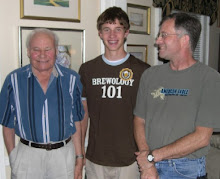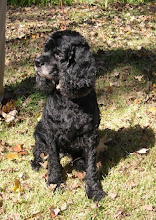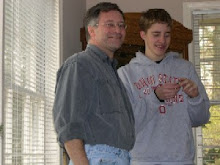


Many additional surnames went into the gene pool of the current three Atkins boys. Male surnames go on and on while female family names get lost after just a few generations – not to mention those male Y-chromosomes that remain a positive DNA identifier for thousands of years.
Our three Atkins Boys are fortunate that they come from a long line of female ancestors who were and are dedicated to preserving their sides of the family story. They are interesting stories, indeed. Today, you will meet the Ulbrich Boys.
Above you see Carl Ferdinand Ulbrich, the senior Atkins boy's grandfather, and his sons. His daughter, Mary Alice, mother to Asa Carl Atkins, is not in this picture. The mother of all those sons isn't in it either. But that's another story.
Our three Atkins Boys are fortunate that they come from a long line of female ancestors who were and are dedicated to preserving their sides of the family story. They are interesting stories, indeed. Today, you will meet the Ulbrich Boys.
Above you see Carl Ferdinand Ulbrich, the senior Atkins boy's grandfather, and his sons. His daughter, Mary Alice, mother to Asa Carl Atkins, is not in this picture. The mother of all those sons isn't in it either. But that's another story.
Carl Ferdinand Ulbrich was a Lance Corporal in the Franco-Prussian War that united all of Germany. During the Second German Empire (1871 to 1918) every male, including Ferdinand, had a military obligation that extended from age 17 to age 47. It included active duty in the standing armed forces at age 20 for three years; reserve duty in the standing army for four years; militia of the first contingent for five years and of the second contingent for seven years; and home guard duty from age 17 to age 45.
Can you imagine being in the Army for 30 years, like it or not? Every German male had a military pass that was his official record of service; it also tracked his travels from place to place. We happen to have Ferdinand's military pass. The last entry includes the words, "(Amerika) big ultimo." We take this to mean "for all time." Check it out above.
After the war, Ferdinand built railroad boxcars in Breslau, Germany (now Wroclaw, Poland) while he helped save enough money for the family to come to America. The younger picture of him shown above was taken during this stage of his life.
Ferdinand's father, Gottfried Ulbrich, was a farmer, miller, and carpenter in Prussia. He built windmills, coffins, and door and window frames with hand carved details. Although Baron Otto von Bismarck had succeeded in uniting all of Germany, his rule was brutal. Average people were starving but were not allowed to hunt in the vast forests that belonged to the aristocracy.
The Ulbrich family and four other families from their small village came to America to escape their terrible living conditions. They were steerage passengers aboard the ship Holsatia that left from Hamburg with a stop in Le Havre to take on more passengers. They arrived in New York on Ferdinand's birthday in 1873, long before Ellis Island was built.
Most German men belonged to brass bands and the Ulbrich men were no exception. They played their instruments aboard ship in the evenings while wealthier passengers on the upper decks tossed down coins that they carefully saved. Ferdinand played the B-flat cornet.
After arriving in America, they first went Chicago but found it too large and industrialized. They then went to the steel mill area of western Pennsylvania where they hoped to find work. Friends had moved on to West Virginia and reported that living conditions were much better there. So Gottfried and his family moved again. He built and operated a mill while Ferdinand and his brothers worked in the coal mines. Most of the families who came to America together eventually joined them in the hills of West Virginia.
These families lived in fear they might somehow be forced to return to Germany. Unlike today's immigrants, they tried very hard to become Americanized as soon as possible. Ferdinand became Fred. Beate became Betty. Gottfried had six sons by two wives. Ferdinand had nine sons and two daughters by two wives. None of those born in America were taught the German language.
On this Veterans Day, we consider the fight their sons would have fought if they had stayed in Germany. It's something we Americans don't often think about.
All of us would have had very different lives if our ancestors hadn't taken that great leap of faith to leave their homelands. We hadn't thought much about it either until we met a 30-year-old German man named Bernard Schmidt when we were living in Raleigh, NC.
During a pre-dinner conversation, Carl asked Bernard if his father had participated in World War II. The look on his face was an immediate giveaway that this was not a question he was usually asked. His response gave us a perspective we would not have otherwise had. He simply said, "Yes. He was drafted. It was no different from your own army. If you were drafted you were required to serve." And that was the end of the conversation.
With so many World War II movies popular just now, it is easy for us to fall into the trap of thinking that all Germans hated the Jewish people and all of them committed horrible atrocities against them. While knowing those atrocities occurred, Bernard's comments made us stop and think in a whole new light.
We recently read a wonderful book entitled, "Those Who Save Us" by an author named Jenna Blum. It sheds light on the fact that many German citizens did their part to save their Jewish neighbors, often at great risk to themselves. I encourage you to read it.
As for the Ulbrich men, who knows? We know they had Jewish neighbors in their small town of Hammer, Militsch Kreis, Prussia. If they had stayed, they would have lived near one of the worst German labor camps of World War II.
What would their choices have been? We can only speculate that they would have made the choices that most of us living in America today would make. And we can be very thankful that neither they nor their descendants ever had to make those choices.
The Atkins family is thankful that our German ancestors came to America and we are proud that their descendants have served in America's armed forces ever since, including our own Asa Carl Atkins, Jr. We will honor all of them on this Veterans Day.
Can you imagine being in the Army for 30 years, like it or not? Every German male had a military pass that was his official record of service; it also tracked his travels from place to place. We happen to have Ferdinand's military pass. The last entry includes the words, "(Amerika) big ultimo." We take this to mean "for all time." Check it out above.
After the war, Ferdinand built railroad boxcars in Breslau, Germany (now Wroclaw, Poland) while he helped save enough money for the family to come to America. The younger picture of him shown above was taken during this stage of his life.
Ferdinand's father, Gottfried Ulbrich, was a farmer, miller, and carpenter in Prussia. He built windmills, coffins, and door and window frames with hand carved details. Although Baron Otto von Bismarck had succeeded in uniting all of Germany, his rule was brutal. Average people were starving but were not allowed to hunt in the vast forests that belonged to the aristocracy.
The Ulbrich family and four other families from their small village came to America to escape their terrible living conditions. They were steerage passengers aboard the ship Holsatia that left from Hamburg with a stop in Le Havre to take on more passengers. They arrived in New York on Ferdinand's birthday in 1873, long before Ellis Island was built.
Most German men belonged to brass bands and the Ulbrich men were no exception. They played their instruments aboard ship in the evenings while wealthier passengers on the upper decks tossed down coins that they carefully saved. Ferdinand played the B-flat cornet.
After arriving in America, they first went Chicago but found it too large and industrialized. They then went to the steel mill area of western Pennsylvania where they hoped to find work. Friends had moved on to West Virginia and reported that living conditions were much better there. So Gottfried and his family moved again. He built and operated a mill while Ferdinand and his brothers worked in the coal mines. Most of the families who came to America together eventually joined them in the hills of West Virginia.
These families lived in fear they might somehow be forced to return to Germany. Unlike today's immigrants, they tried very hard to become Americanized as soon as possible. Ferdinand became Fred. Beate became Betty. Gottfried had six sons by two wives. Ferdinand had nine sons and two daughters by two wives. None of those born in America were taught the German language.
On this Veterans Day, we consider the fight their sons would have fought if they had stayed in Germany. It's something we Americans don't often think about.
All of us would have had very different lives if our ancestors hadn't taken that great leap of faith to leave their homelands. We hadn't thought much about it either until we met a 30-year-old German man named Bernard Schmidt when we were living in Raleigh, NC.
During a pre-dinner conversation, Carl asked Bernard if his father had participated in World War II. The look on his face was an immediate giveaway that this was not a question he was usually asked. His response gave us a perspective we would not have otherwise had. He simply said, "Yes. He was drafted. It was no different from your own army. If you were drafted you were required to serve." And that was the end of the conversation.
With so many World War II movies popular just now, it is easy for us to fall into the trap of thinking that all Germans hated the Jewish people and all of them committed horrible atrocities against them. While knowing those atrocities occurred, Bernard's comments made us stop and think in a whole new light.
We recently read a wonderful book entitled, "Those Who Save Us" by an author named Jenna Blum. It sheds light on the fact that many German citizens did their part to save their Jewish neighbors, often at great risk to themselves. I encourage you to read it.
As for the Ulbrich men, who knows? We know they had Jewish neighbors in their small town of Hammer, Militsch Kreis, Prussia. If they had stayed, they would have lived near one of the worst German labor camps of World War II.
What would their choices have been? We can only speculate that they would have made the choices that most of us living in America today would make. And we can be very thankful that neither they nor their descendants ever had to make those choices.
The Atkins family is thankful that our German ancestors came to America and we are proud that their descendants have served in America's armed forces ever since, including our own Asa Carl Atkins, Jr. We will honor all of them on this Veterans Day.







